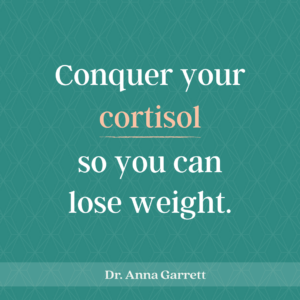What am I doing wrong??
There you sit, staring at what seems like your millionth salad (with dressing on the side).
Day after day…salad. You’re barely eating enough to keep a bird alive and exercising like a crazy woman.
And yet, the needle on the scale continues to creep up.
You wonder what you’re doing wrong.
You feel like a stuffed sausage in your skinny jeans.
Your muffin top keeps growing.
The good news is that you may be doing nothing “wrong.” The bad news is that cortisol may have climbed into the driver’s seat on the bus…and you’re going to have to put her back where she belongs.
Cortisol can be your best friend or your worst enemy. If a speeding train is heading toward you, she’s your BFF for sure…a rush of cortisol will spur you to jump out of the way.
But in overdoses, cortisol is the “mean girl” in your body’s neighborhood.
Cortisol is released in stressful situations. On a short-term basis, this is healthy. Long-term, it leads to chronic illness, body breakdown, and weight gain. Unfortunately, something can be stressful to your body without you actually FEELING the stress in a big way.
Three excellent examples of this are lack of sleep, eating at irregular times, and overtraining.
In all of these cases, your body goes into “fight or flight” mode and begins to produce more cortisol and hang onto fat. YOU, on the other hand, notice the weight gain and begin to cut back even more on food and exercise harder. You lie awake at night wondering what the heck is going on and your body never has a chance to repair itself. This sets up a vicious cycle that cannot be broken by pushing through it.
What’s a Girl to Do??
We often hear about stress management as it relates to cortisol. But there are other strategies that can help keep the “mean girl” under control. Best of all, these things are free and will really improve the way you feel (and your ability to get to your natural weight).
- Get enough sleep. There are reams of data that prove sleeping less than 6 hours a night leads to weight gain. We don’t need more studies. We need to go to bed. Seven to eight hours a night is ideal.
- Eat on a regular schedule. Your body expects to be fed at regular intervals. When that doesn’t happen, it thinks it’s going into starvation mode. Cortisol rushes in to save the day by preserving fat stores…this is exactly what you DON’T want! If you are so busy that you forget to eat, set an alarm that reminds you to do this. Include plenty of protein to keep blood sugar swings to a minimum. If you are doing intermittent fasting and getting no results, this is probably what’s going on
- Be gentle on your body. When I trained for the Susan G. Komen 3-Day in 2011, I walked MILES and MILES every week. I did not lose an ounce. But after it was over, I immediately lost 8 lbs. I asked my trainer what was up with that? He said I had been overtraining (more cortisol). When I stopped, the weight came off.
The message here is that flogging your body with more workouts isn’t the answer. Add in some yoga or a contemplative practice or try gentle exercises like walking to tame your cortisol levels.
Bottom Line
 Using these 3 practices is a great start toward achieving your weight goals because unless you conquer cortisol, your efforts will feel like slogging through molasses. If you want to go deeper, it’s possible to map out your daily cortisol pattern to help you target your management efforts. This can be done with a simple urine test. Knowing your cortisol levels and pattern throughout the day allows you and your provider to create a plan using lifestyle, nutrition, and adrenal support supplements to get you back on track. If you’d like to learn more about this, please email me at info@drannagarrett.com.
Using these 3 practices is a great start toward achieving your weight goals because unless you conquer cortisol, your efforts will feel like slogging through molasses. If you want to go deeper, it’s possible to map out your daily cortisol pattern to help you target your management efforts. This can be done with a simple urine test. Knowing your cortisol levels and pattern throughout the day allows you and your provider to create a plan using lifestyle, nutrition, and adrenal support supplements to get you back on track. If you’d like to learn more about this, please email me at info@drannagarrett.com.
Dr. Anna Garrett is a menopause expert and Doctor of Pharmacy. She helps women who are struggling with symptoms of perimenopause and menopause find natural hormone balancing solutions so they can rock their mojo through midlife and beyond. Dr. Anna is the author of Perimenopause: The Savvy Sister’s Guide to Hormone Harmony. Order your copy at www.perimenopausebook.com.
Dr. Anna is available for 1-1 consultation. Find out more at www.drannagarrett.com/lets-talk




